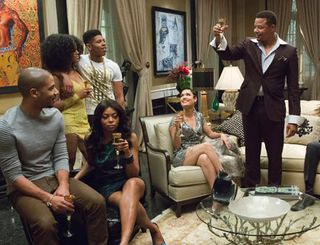Broadcasters Diversifying Their 'Empire's

Mired in fourth place in Nielsen’s current 18-49 ratings, Fox needed a big midseason premiere. On Jan. 7, Empire delivered. Drawing a 3.8 live-plus-same-day demo number, the drama series—about an African-American family prominent in the world of hip-hop—was the network’s highest-rated premiere in three years. Empire outperformed its American Idol lead-in by 19%. It also matched ABC’s How to Get Away With Murder as the highest-rated premiere of the 2014-15 season.
Murder, from executive producer Shonda Rhimes, features African-American actress Viola Davis at the head of an ethnically diverse cast. Until Empire came along, it was the undisputed frontrunner to finish as the season’s top-rated new drama. When ABC Entertainment president Paul Lee addressed reporters at the TCA winter press tour Jan. 14, he touted the network’s on-screen diversity, talking up Murder as well as comedies Black-ish (the highest rated new comedy this season), Cristela (a contender, though not a sure bet, for renewal that features a Latino family) and the upcoming Fresh Off the Boat (the first broadcast comedy built around an Asian-American family since Margaret Cho’s All-American Girl in 1994).
“The changes in the demographics in the U.S. are every bit as important a revolution as the technological changes that we’re all going through,” Lee told reporters. Earlier that week, Gina Rodriguez, the Latina lead of Jane the Virgin won the Golden Globe for best actress in a TV musical or comedy, the first Globe ever awarded to The CW.
Speaking to CBS Entertainment chairman Nina Tassler after her TCA executive session Jan. 12, B&C asked whether the launches of Black-ish and Empire had impacted her approach to the current development season. “Absolutely,” Tassler said. “It’s great for our business.” Calling herself a fan of Blackish and How to Get Away With Murder, and pointing to CBS summer series Extant, starring Halle Berry, Tassler added, “These are important steps forward for all networks, and we just have to continue casting the net wider and wider.”
The Right Direction
A wider-cast net has been a stated goal for broadcasters since the NAACP threatened an advertiser boycott in 1999. This season has seen improvement, with GLAAD’s most recent annual “Where We Are on TV” study finding 27% of series’ regular characters projected to appear in the current season to be ethnically diverse. Previous seasons had stagnated, fluctuating between 22% and 23%.
“There is still much more that television can be doing to attract African-Americans,” said Brad Siegel, president of African-American-targeting cable channel TV One. Television has struggled so long to reach a black audience, Siegel added, “because television programmers are not black, and I don’t think that they are familiar with stories and subject matter and the cultural relevance of the black population.”
Broadcasting & Cable Newsletter
The smarter way to stay on top of broadcasting and cable industry. Sign up below
Broadcasters, forced to compete with an increasing number of cable networks presenting ever-more hours of original programming, as well as ramped-up competition from digital services such as Netflix and Amazon, have seen their audiences shrink. The pressure to maintain a large enough audience to sustain the broadcast business model may now be forcing networks to look to groups they have traditionally neglected.
The African-American audience carries upside. According to a September report released by Nielsen and Essence magazine, African-Americans watch an average of 45 hours of television per week—14 hours more than any other group. But much of what they view comes from cable. The study found that of the 25 shows most watched by African-Americans, 76% are on networks such as TV One, BET and Bounce TV that target African-Americans.
“I think it’s only recently that, because of the success of a few shows on cable and the success of a network like TV One or BET, that non-African-American networks have started to target those audiences with one or two shows or a night,” Siegel said. “Some of those shows may have diverse casts or black casts, but they’re shows that could just as easily not have diverse casts, which talks to the fact that they’re not really culturally unique.”
Questions of authenticity in Fresh Off the Boat were raised in a Jan. 13 New York magazine essay in which Taiwanese-American chef Eddie Huang, on whose memoir the series is based, criticized the selection of Nahnatchka Khan, a Persian-American writer and the creator of Don’t Trust the B---- in Apartment 23 as showrunner. Khan and Huang appeared together at a TCA panel for the show the day after the essay was published, each praising the other as they promoted the show. Speaking to B&C post-panel, Khan said she sees broadcasters’ appetites for diversity increasing.
“People from the creatives to the studios to the networks have been trying to do something like this for years,” Khan said of the current influx of diverse programming. “Now is the time that it’s all coming together. People are diverse. There are all different kinds of Americans. There are audiences to be serviced that aren’t seeing themselves represented or seeing any part of their experience represented.”
